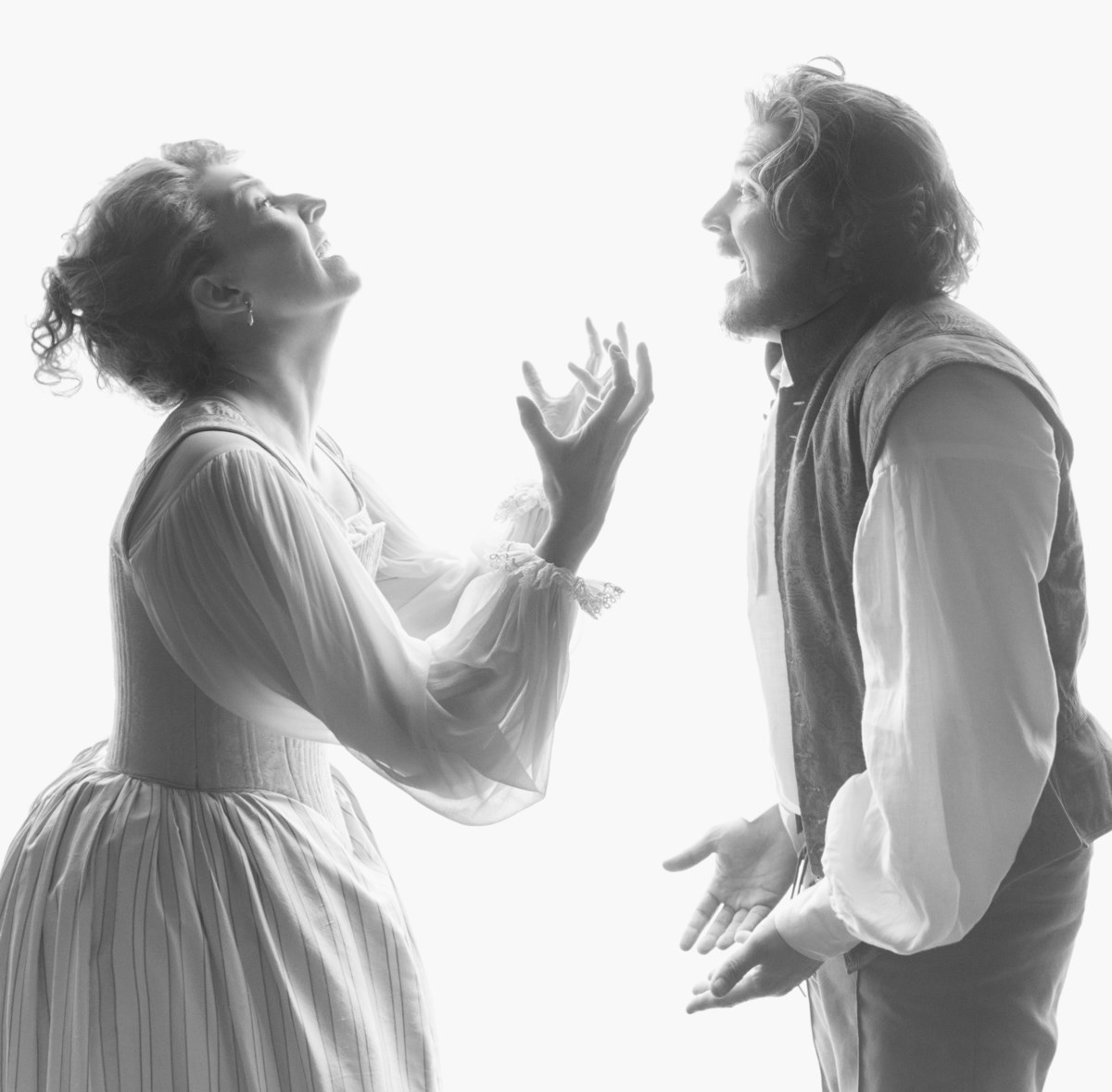Shakespeare’s Much Ado About Nothing requires nothing short of a brilliant company of actors in tune with and able to convey the play’s generous slices of humour offset by dramatic ruminations on honour, duplicity, and tragic misinterpretation.
Skilfully directed with robust energy by Chris Abraham and performed with non-stop vigour by a superb cast led by Graham Abbey and Maev Beaty, the Stratford Festival’s version of the classic comedy drew lengthy standing ovations with hoots of approval from an appreciative audience.
As the supposedly confirmed bachelor Benedick, Abbey is a delight engaging in numerous hilarious battles of wit with Beaty’s equally high-spirited Beatrice, one of the playwright’s most independent female leads.
Running parallel is a second love story between the heroic but ultimately naïve Claudio, fleshed out in fine, arrogant fashion by Austin Eckert and Allison Edward-Crewe’s richly drawn Hero who, unlike her argumentative cousin Beatrice, is a less assertive and more traditional female of the times.
After a successful military operation Don Pedro (André Sills), Prince of Aragon arrives at the estate of Leonato (an expressive Patrick McManus), the governor of Messina and Hero’s loving father. Invited to stay a month, along with a company of soldiers including Benedick and Claudio, the never-ending intrigue begins at a masked ball – an event appropriately symbolizing hidden meanings.
Before marrying off the enamoured couple Claudio and Hero, all seems well with Leonato’s plan to secretively bond together Benedick and Beatrice, both vocal in their opposition to any sort of union.
Yet lurking about in the shadows is the treacherously jealous and envious Don John (Michael Blake), the illegitimate brother of Don Pedro who devises a plot to set the two young lovers at odds with his quickly spread rumour that Hero has been unfaithful to Claudio.
With this nefarious scheme in full blossom, the audience is treated to some deliciously evil characterizations courtesy of Blake and his wonderfully effective, deviant flunkies Borachio and Conrade, played to the hilt respectively in scurrilous fashion by Jakob Ehman and Cyrus Lane.
What director Abraham wanted was great comedy with dark, deep laughs, alongside a sense of genuine jeopardy and the continuous fear that real danger is ever present. That is exactly what he gets and much more from this gifted company.
While the expression much ado about nothing means making a big deal out of a small or non-existent problem, such is not always the case in this Shakespearean work, as demonstrated repeatedly by this trio of villains.
Then there’s the presence of numerous beard jokes within the dialogue. As a symbol of masculinity Benedick, replete with the requisite facial foliage refers to the clean-shaven Claudio as “Lord Lackbeard” in Act 5, Scene 1.
Explaining why she must remain single, even Beatrice has her moments of vivid anti-beard sermonizing:
“What should I do with him – dress him in my apparel and make my waiting gentlewoman? He that hath a beard is more than a youth, and he that hath no beard is less than a man; and he that is more than a youth is not for me, and he that is less than a man, I am not for him.” Act 2, Scene 1.
Over the years Dogberry – the eccentric constable and town night watch leader in Messina – has become a favourite with actors and audiences, largely because of his frequent misuse of words that sound like the correct choice. The character was created for William Kempe, a comedic actor in Shakespeare’s theatre company – the Lord Chamberlain’s Men.
Showcasing his misplaced malapropisms – sometimes called dogberryisms – this season’s version has Josue Laboucane at the top of his game, playing the part both vocally and physically with relish while stealing all the scenes in which he appears.
While he and his equally inept deputy Verges (John Kirkpatrick) do not make their entrances until Act 3, they prove essential, not just as comic relief but as plot devices that move the storyline forward and away from tragedy.
Dogberry may seem simply an absurdist figure, yet he is nonetheless instrumental – despite himself – in the arrest of Borachio and Conrade and the dismantling of Don John’s deceptive plot.
Yet one cannot escape the sheer joy of taking in his malapropisms scattered through the production, such as replacing “respect” with “suspect” or “piety” with “impiety.” Meaning to say the word communication, he blurts out … “Only the learned writer to set down our excommunication, and meet me at the jail.” – Act 3, Scene 5.
Confusing suspect with respect, he adds, “Dost thou not suspect my place? Dost thou not suspect my years?”– Act 4, Scene 2. There are countless other misunderstandings and misinterpretations that offer Laboucane golden opportunities to steal the limelight, which he does gleefully and with great aplomb.
Doing a boisterously clever take on the popular figure, the Stratford Festival actor is in fine company with Michael Keaton who tackled the role in Kenneth Branagh’s 1993 film adaptation and Nathan Fillion doing likewise in Joss Whedon’s witty, modernized, and jazzy 2012 version.
With puns, wordplays, and witticisms the order-of-the- day in Much Ado About Nothing – featuring additional text by Erin Shields, the adapter of Milton’s Paradise Lost in 2018 – several cast members shine in the spotlight including Déjah Dixon-Green and Akosua Amo-Adem as Hero’s boisterously vocal ladies-in-waiting Margaret and Ursula with Gordon Patrick White as the thoughtful, pragmatic Friar Francis.
Onstage musicians George Meanwell, Jonathan Rowsell and Stephan Szczesniak provide quality interludes with timely, atmospheric traditional tunes, while Julie Fox’s set features a sturdy old tree hanging magnificently over the action that deserves accreditation as a supporting actor.
For those obsessed with Shakespeare – thank you George Bernard Shaw for your explanatory Bardolatry – and novices to his work, this is not-to-be-missed five-star entertainment. Much Ado About Nothing plays until October 27 at the Festival Theatre.














